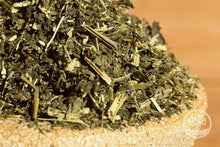NETTLE LEAVES
Urtica dioica
Nettle Leaves are an ideal ingredient for your culinary creations.
The humble Nettle often receives ungrateful treatment. Cursed as a weed and shunned for its avenging sting, most people try to avoid it or eradicate it from their gardens. However, their efforts are rarely met with success as even the smallest piece of root can give rise to new shoots. Yet, Nettles have not always been regarded with such disdain. The Romans valued them quite highly, not just for their medicinal powers, but also as a pot herb, and, surprisingly, even for their dreaded stinging power. They used Nettles to flagellate painful arthritic joints, which is said to bring relief to the aching parts. They also prepared a body oil with Nettle tops, which, as they claimed, kept them warm and helped them endure the unbearably cold British winters. Nettles could have kept them warm in a less stinging way, though, had they spun its fibres into some fine, tough yarn and woven this into warm robes and blankets. Nettles yield one of the strongest, most resilient natural plant fibres available. In the age of exploration, all ships of the British fleet were set with sails made of Nettle fibre. Nettle yarn was still much used until the First World War when most military garb was fashioned from it. With the discovery of artificial fibres Nettle yarn fell into disuse - until its recent rediscovery. Today, Nettle is gaining unprecedented new popularity in the natural fibres trade, as it can be grown without the use of massive fertilisers and pesticides. But that is just one of its numerous gifts for which they deserve appreciation.
Traditional
Dried Nettles may feel a little prickly, but they do not sting and they yield their nutritional benefits without much further ado. Nettles are very cleansing on both, the digestive tract and the kidneys, from which they remove waste materials in a thorough, yet un-dramatic way. Nettles have the ability to flush out uric acid crystals from arthritic joints and will eliminate them via the kidneys. Thus, they can be used as a supportive blood cleansing remedy for skin conditions such as eczema or for rheumatic and arthritic conditions. They are strongly diuretic and can be helpful in cases of oedema or to support the treatment of bladder and kidney complaints. Nettles are very rich in iron and provide good nutritional support for women, especially during pregnancy or menstruation. They are styptic and will help to inhibit internal and external bleeding. They also have an anti-inflammatory and anti-histamine effect, which, in combination with other herbs, is used to control hay fever and other allergic reactions. The leaves can stimulate the production of mother's milk, while the seeds are said to increase sexual potency in men.
Magical
Nettles are often mentioned in association with love potions. Especially the seeds are said to have aphrodisiac properties. Nettles are also used for protection - worn as amulets or hung above stable doors they ward off evil witches and demons. In particular, Nettles are often used to protect milk or beer from turning sour during a thunderstorm. A wide range of conditions was addressed by various sympathetic folk-medicine practices that involved Nettles. It is a classic spring cleansing herb and sacred foods such as Nettle pudding, Nettle soup and Nettle beer not only act physically restorative, but also confer protection against disease and are said to attract good fortune for the entire year.





